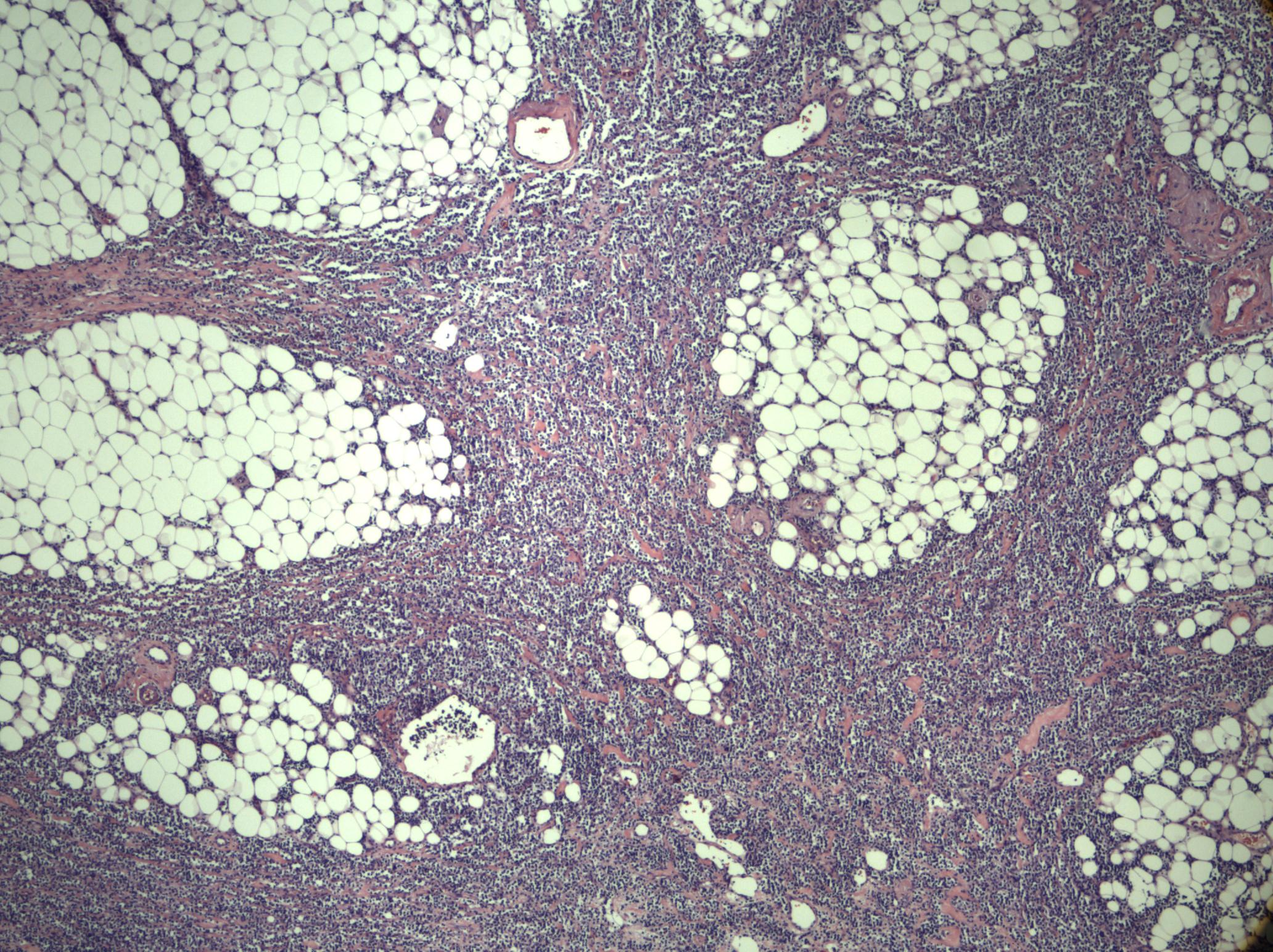Tuesday Poster Session
Category: Colon
P4730 - Lymphoma Masquerading as Diverticulitis: A Rare Cause of Colonic Perforation in an Elderly Patient
Tuesday, October 28, 2025
10:30 AM - 4:00 PM PDT
Location: Exhibit Hall

Yashaswi Koguru, MD (she/her/hers)
HCA Healthcare
Myrtle Beach, SC
Presenting Author(s)
Yashaswi Koguru, MD1, Brenden Pearce, DO1, Reggie Skains, DO2, Minh Nguyen, DO1, Gary Drew, MD, MPH2, Naren S. Nallapeta, MD1
1HCA Healthcare, Myrtle Beach, SC; 2Grand Strand Medical Center, Myrtle Beach, SC
Introduction: Gastrointestinal (GI) perforation in elderly patients is typically attributed to common causes such as diverticulitis, ischemic colitis, or colorectal carcinoma. However, rare malignancies like follicular lymphoma can masquerade as these more frequent etiologies, complicating timely diagnosis and treatment.
Case Description/
Methods: We present the case of an 88-year-old female with a history of hypertension, diabetes mellitus, hyperlipidemia, peptic ulcer disease, and prior toe amputations due to gangrene, who was admitted with generalized weakness, fatigue, and poor appetite. She also reported intermittent hematochezia, and recent imaging had incidentally identified a colonic mass. Laboratory findings revealed leukocytosis and mild renal impairment. Colonoscopy demonstrated a perforated sigmoid diverticulum without overt malignancy, and biopsies showed benign granulation tissue. Imaging suggested complicated diverticulitis or a neoplastic process, compounded by vascular studies revealing severe mesenteric stenoses.
Surgical exploration via robotic-assisted Hartmann’s procedure uncovered significant retroperitoneal lymphadenopathy. Histopathological evaluation of the resected colon confirmed colonic perforation without carcinoma, while lymph node biopsy and flow cytometry identified a CD10-positive monoclonal B-cell population consistent with follicular lymphoma, grade 1. The patient’s perforation was attributed to lymphomatous infiltration of the bowel wall, with possible contributory ischemic compromise.
Discussion: This case highlights the importance of maintaining a broad differential diagnosis in elderly patients with atypical colonic inflammation or mass-like lesions. While follicular lymphoma is predominantly nodal and indolent, its rare gastrointestinal presentations may mimic more common pathologies and lead to complications such as perforation. Early tissue diagnosis and multidisciplinary coordination, including surgical and oncologic management, are essential for optimal care. This report underscores the need for heightened clinical suspicion and comprehensive evaluation in patients with discordant imaging, endoscopic, and clinical findings.

Figure: Lymphoid infiltrate with nodular pattern--suggestive of follicular lymphoma
Disclosures:
Yashaswi Koguru indicated no relevant financial relationships.
Brenden Pearce indicated no relevant financial relationships.
Reggie Skains indicated no relevant financial relationships.
Minh Nguyen indicated no relevant financial relationships.
Gary Drew indicated no relevant financial relationships.
Naren Nallapeta indicated no relevant financial relationships.
Yashaswi Koguru, MD1, Brenden Pearce, DO1, Reggie Skains, DO2, Minh Nguyen, DO1, Gary Drew, MD, MPH2, Naren S. Nallapeta, MD1. P4730 - Lymphoma Masquerading as Diverticulitis: A Rare Cause of Colonic Perforation in an Elderly Patient, ACG 2025 Annual Scientific Meeting Abstracts. Phoenix, AZ: American College of Gastroenterology.
1HCA Healthcare, Myrtle Beach, SC; 2Grand Strand Medical Center, Myrtle Beach, SC
Introduction: Gastrointestinal (GI) perforation in elderly patients is typically attributed to common causes such as diverticulitis, ischemic colitis, or colorectal carcinoma. However, rare malignancies like follicular lymphoma can masquerade as these more frequent etiologies, complicating timely diagnosis and treatment.
Case Description/
Methods: We present the case of an 88-year-old female with a history of hypertension, diabetes mellitus, hyperlipidemia, peptic ulcer disease, and prior toe amputations due to gangrene, who was admitted with generalized weakness, fatigue, and poor appetite. She also reported intermittent hematochezia, and recent imaging had incidentally identified a colonic mass. Laboratory findings revealed leukocytosis and mild renal impairment. Colonoscopy demonstrated a perforated sigmoid diverticulum without overt malignancy, and biopsies showed benign granulation tissue. Imaging suggested complicated diverticulitis or a neoplastic process, compounded by vascular studies revealing severe mesenteric stenoses.
Surgical exploration via robotic-assisted Hartmann’s procedure uncovered significant retroperitoneal lymphadenopathy. Histopathological evaluation of the resected colon confirmed colonic perforation without carcinoma, while lymph node biopsy and flow cytometry identified a CD10-positive monoclonal B-cell population consistent with follicular lymphoma, grade 1. The patient’s perforation was attributed to lymphomatous infiltration of the bowel wall, with possible contributory ischemic compromise.
Discussion: This case highlights the importance of maintaining a broad differential diagnosis in elderly patients with atypical colonic inflammation or mass-like lesions. While follicular lymphoma is predominantly nodal and indolent, its rare gastrointestinal presentations may mimic more common pathologies and lead to complications such as perforation. Early tissue diagnosis and multidisciplinary coordination, including surgical and oncologic management, are essential for optimal care. This report underscores the need for heightened clinical suspicion and comprehensive evaluation in patients with discordant imaging, endoscopic, and clinical findings.

Figure: Lymphoid infiltrate with nodular pattern--suggestive of follicular lymphoma
Disclosures:
Yashaswi Koguru indicated no relevant financial relationships.
Brenden Pearce indicated no relevant financial relationships.
Reggie Skains indicated no relevant financial relationships.
Minh Nguyen indicated no relevant financial relationships.
Gary Drew indicated no relevant financial relationships.
Naren Nallapeta indicated no relevant financial relationships.
Yashaswi Koguru, MD1, Brenden Pearce, DO1, Reggie Skains, DO2, Minh Nguyen, DO1, Gary Drew, MD, MPH2, Naren S. Nallapeta, MD1. P4730 - Lymphoma Masquerading as Diverticulitis: A Rare Cause of Colonic Perforation in an Elderly Patient, ACG 2025 Annual Scientific Meeting Abstracts. Phoenix, AZ: American College of Gastroenterology.
